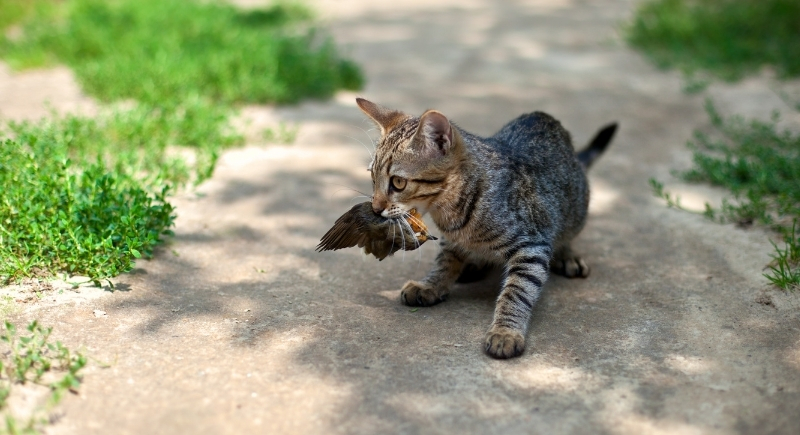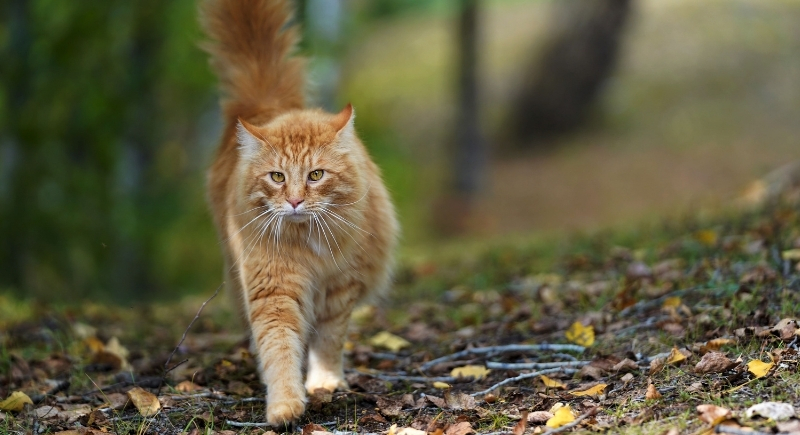Your Outdoor Cat Is Contributing to a Bird Apocalypse, According to New Study
Most cat owners think of their pets as gentle wanderers that bring life to the yard. But new research from the University of Guelph shows a darker side to that freedom. The study estimates that outdoor cats kill about 60 million birds in Canada every year. Scientists warn this impact reaches far beyond national borders and adds to a growing decline in bird populations around the world.
The Cat Predation Problem

Image via Getty Images/vvvita
The research, published in Avian Conservation and Ecology, found that roughly 3.5 million cats roam outdoors in Canada. Those cats, owned and feral, are taking down everything from robins and finches to young migratory birds just learning to fly. Earlier estimates from 2013 suggested up to 348 million birds were dying each year in Canada, but newer data paints a clearer picture thanks to improved technology. Cats fitted with tiny cameras called catcams show that many kills go unseen by owners. A cat might bring home one dead bird, but could have killed five.
In the United States, the situation is even more alarming. Studies by the Smithsonian Conservation Biology Institute and the U.S. Fish and Wildlife Service found that cats kill between 1.3 and 4 billion birds every year. The NYC Bird Alliance calls free-roaming cats the largest single human-caused threat to birds, even deadlier than window strikes, which claim up to a billion bird lives annually.
Why Birds Can’t Catch a Break
Cats are hunters by instinct. They don’t need to be hungry to stalk, pounce, and kill. That instinct evolved long before domestication and still kicks in the moment a paw hits the grass. Ornithologists say the problem isn’t just direct kills. The presence of cats alone stresses birds, especially during breeding season. Ground-nesting birds often abandon their nests when cats are nearby, which often leads to slower chick growth or total nest failure. A British study found that young birds grew about 40% slower in areas with regular cat activity.
Bird loss also affects ecosystems that humans depend on. Fewer birds mean weaker seed dispersal, slower forest recovery, and lower carbon storage. Research from the Crowther Lab at ETH Zurich showed that healthy bird populations can increase tropical forest carbon storage by up to 38%. Birds also help control insect populations, reducing crop damage and benefiting food security.
A Growing Ethical Dilemma

Image via Pexels/Jody Parks
The conversation about outdoor cats often gets heated. People adore their pets, but free-roaming cats are technically an invasive species. They exist in habitats where they wouldn’t naturally survive without human help, and their hunting has driven at least 63 vertebrate species to extinction globally, even well-fed house cats hunt, driven by instinct, not hunger. Meanwhile, feral cat colonies sustained by kindhearted feeders can continue to decimate bird populations if not managed.
Researchers and conservationists agree that humans created this problem and need to fix it. The most effective solution is simple: keep cats indoors. Indoor cats live longer and healthier lives, avoiding cars, fights, and disease. For those who feel bad keeping them inside, options like catios (outdoor enclosures) and leash walks offer safe ways for cats to enjoy the fresh air without wiping out wildlife. Studies show that bells or brightly colored collars can cut down hunting success by about 50%, giving birds a fighting chance.
Finding a Balance
Cat owners like Toronto’s April Campbell are already making changes. She built a catio for her five rescue cats so they can bask in the sun without harming birds. Conservationists see this kind of compromise as a path forward. It protects wildlife while keeping pets happy and safe.
The University of Guelph study’s takeaway is clear: this isn’t a war between cat lovers and bird lovers. It’s about responsibility. Outdoor cats are part of a global ecological crisis, and small choices like keeping them indoors can have a massive impact. Protecting birds doesn’t mean giving up on cats. It means giving both species a fair chance to survive.